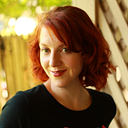Become a Better Storyteller
Recently, there’s been a lot of debate among Writing Twitter about whether or not writers, particularly indie writers, should invest in professional editing, and how much editing is needed. I address some of that in my book, Self-Publishing for the Broke Author, and I plan to go deeper into that discussion in the future. But the short answer to both of those questions is, it depends.
One way that you can both improve as a writer and reduce your need for professional editing help? Become a better storyteller. While that’s not something you can do overnight, it’s definitely an achievable goal, which you can reach by taking the time and effort to learn the mechanics of good storytelling, what makes stories work, and honing your story instincts by exposing yourself to well-executed stories until these things become second nature.
Here are just a few ways you can start building your storytelling skills today.
- Start reading. A writer who doesn’t read is like a doctor who’s never dissected a cadaver or a mechanic who’s never looked under the hood of a car. Reading is the best way to learn how books are written and how stories work well. Read widely, both in and outside of your preferred genre, as much and as often as you can, and you’ll absorb a good instinct for story by sheer osmosis.
“But I don’t have time to read,” you say. To which I say, if you’ve got time to read this post, you’ve got time to read a book. Even if you can only squeeze in a few minutes of reading time a day, you’ll be way ahead of the curve. Remember that you’re not in a race or a competition to see how many books you can read in a year. Carry a book with you — you have access to entire libraries on your smart phone — and instead of scrolling social media whenever you’ve got a few minutes with nothing to do, spend that time reading your book. And yes, audio books do count. - Consume stories in other media. You can actually learn a lot about writing and storytelling by watching TV or movies, but only if you actively engage in the stories being told and don’t just turn off your brain and passively watch what’s happening. Don’t just pay attention to the plot, but ask yourself questions like, “Why was that such a great scene,” or, “why didn’t that scene work for me,” or, “what made that such a memorable line?” Pay attention to things like pacing, plotting, dialogue, character development, and season-long story or character arcs, and think about why they do or don’t work.
- Learn the structure and mechanics of good storytelling. A lot of young writers feel stifled by things like rules and structure, but these things exist for good reason, and they’ve been developed and honed over millennia — ever since the first time a human decided to sit down and tell their story to another human. This doesn’t mean you need to go back to college or enroll in an expensive online course. A great place to start is How Story Works, a podcast by bestselling novelist and college writing instructor Lani Diane Rich which is basically a free masterclass in storytelling. Each episode is only 10 to 15 minutes long, so this doesn’t even require a huge time commitment, and your writing will definitely be all the better for it.
- Or you could read about it. Story: Substance, Structure, Style and the Principles of Screenwriting by Robert McKee is a book I’ve recommended here before, for good reason. Although the focus is on screenwriting, just about everything the book covers about structure, pacing and mechanics also applies to novel writing. This textbook is basically the bible of how story works, and I refer to it again and again to help me write engaging page-turners with well-developed characters.
The more time you spend exposing yourself to well-crafted stories and learning the toolbox that makes them work, the more you’ll hone your instincts for what is or isn’t working in your own stories. This can not only eliminate the need to hire a professional developmental editor to help sort out why your story might not be working, but it can also better equip you for parsing feedback from your beta readers and deciding with more confidence whether or not you disagree.
And if you can only do one of those things? Read! Reading the type of thing you want to write is second only to actual writing practice in helping you develop the skills and knowledge you need in order to write well.
Jean Marie Bauhaus is a hybrid author with four novels to her credit, as well as a freelance writer and editor. She’s also the author of Self-Publishing for the Broke Author: How to Edit Your Manuscript, Format Your Book and Create a Killer Cover on Little to No Money. This is a modified version of a post originally published at daydreamerpublishing.wordpress.com on March 19, 2019.
